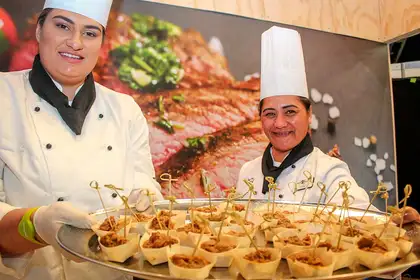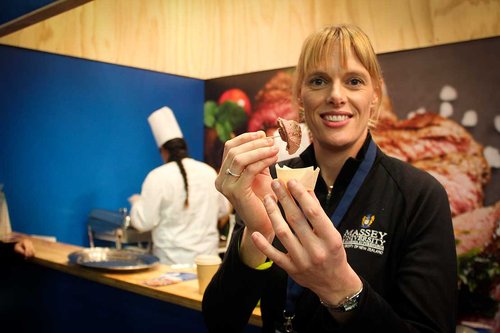
Massey is asking the public to taste-test a potential new beef product developed from dairy-origin cattle, at National Fieldays this year.
Between 10am-12.30pm and 1pm-2.30pm, chefs who have come all the way from the Chatham Islands specifically for the event, are preparing samples for the public at Massey’s stand in the Main Pavilion, allowing a range of attendees to experience New Generation Beef and give feedback.
Developed as part of a Massey-pilot study, New Generation Beef is a new class of red meat that takes surplus calves from the dairy industry and grows them to one-year-of-age. The concept provides an avenue for the under-utilised resource of calves from the dairy industry to produce high quality red-meat.
Project lead, Dr Nicola Schreurs of the School of Agriculture and Environment says the concept of New Generation Beef is building momentum, with the potential to become a marketable-product.
“When we have tested it with farmers at industry events, the response has been really great. At Central Districts Field Days people really loved it, so we are keen to see people’s response to it at Mystery Creek.”

The research at a glance
The pilot used 80 Kiwi-Hereford cross steers that were allocated to slaughter at 8, 10, 12 and 18 months.
The results indicated live weights of 250kg at eight months, 300kg at 10 months and 340kg at 12 months, and 550kg at 18 months. Studies on growth, carcass and meat quality attributes of these types of animals were then conducted.
The meat quality tests were within the expected range and they did not encounter any high pH. The meat got redder as the age progressed which was expected. The shear force [the amount of effort required to cut through the meat] was below 7 kgF, which is extremely tender and associates this as a highly valuable, prime beef.
The next stage of the project will be around finding the optimal calf type and extending the research to consider different types of calves coming from the dairy industry for New Generation Beef. By working alongside the Beef + Lamb NZ Genetics Dairy-Beef Progeny test being led by Massey beef researcher Rebecca Hickson, there is a potential to identify sires that allow for better production of beef using dairy-beef cattle. The New Generation beef research will also consider other potential products and they are working with the Leather and Shoe Research Association (LASRA) to do pelt quality measurements.
The programme will also enrol PhD students to assess the environmental impact of the supply chain and specificities for processing. Mr Hunt will continue on with the project, looking into how New Generation Beef would be implemented in a farm system and Mr Pike will report on the carcass and meat quality characteristics.
The research is supported by the C Alma Baker Trust and Beef + Lamb Genetics NZ.